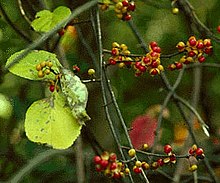Celastraceae
| Celastraceae | |
|---|---|

| |
| Oriental staff vine (Celastrus orbiculatus) | |
| Scientific classification | |
| Kingdom: | Plantae |
| Clade: | Tracheophytes |
| Clade: | Angiosperms |
| Clade: | Eudicots |
| Clade: | Rosids |
| Order: | Celastrales |
| Family: | Celastraceae R.Br.[1] |
| Subfamilies[2] | |
| Synonyms[3] | |
| |
The Celastraceae (staff-vine or bittersweet) are a family of 98 genera[3] and 1,350 species[4] of herbs, vines, shrubs and small trees, belonging to the order Celastrales. The great majority of the genera are tropical, with only Celastrus (the staff vines), Euonymus (the spindles) and Maytenus widespread in temperate climates, and Parnassia (bog-stars) found in alpine and arctic climates.
Of the 98 currently recognized genera of the family Celastraceae, 19 are native to Madagascar and these include at least 57 currently recognized species. Six of these 19 genera (Brexiella, Evonymopsis, Hartogiopsis, Polycardia, Ptelidium, and Salvadoropsis) are endemic to Madagascar.[5] The genera Celastrus, Euonymus, Maytenus, Salacia, and Tripterygium are a few better-known genera.[by whom?] These genera each have distinctive traits and functions of their own.[6]
Genera
[edit]98 genera are accepted by Plants of the World Online as of November 2024[update]:[3]
- Acanthothamnus Brandegee
- Allocassine N.Robson
- Anthodon Ruiz & Pav.
- Apatophyllum McGill.
- Apodostigma R.Wilczek
- Arnicratea N.Hallé
- Bequaertia R.Wilczek
- Brassiantha A.C.Sm.
- Brexia Norhonha ex Thouars
- Brexiella H.Perrier
- Campylostemon Welw. ex Benth. & Hook.f.
- Canotia Torr. – crucifixion thorn
- Cassine L.
- Catha Forssk. ex Scop. – khat
- Celastrus L. – staff vine or staff tree
- Cheiloclinium Miers
- Crossopetalum P.Browne
- Cuervea Triana ex Miers
- Denhamia Meisn.
- Dicarpellum (Loes.) A.C.Sm.
- Dinghoua R.H.Archer
- Elachyptera A.C.Sm.
- Elaeodendron Jacq.
- Empleuridium Sond. & Harv.
- Euonymus L. – spindle
- Evonymopsis H.Perrier
- Fraunhofera Mart.
- Glyptopetalum Thwaites
- Goniodiscus Kuhlm.
- Gyminda (Griseb.) Sarg.
- Gymnosporia (Wight & Arn.) Hook.f.
- Hartogiopsis H.Perrier
- Haydenoxylon M.P.Simmons
- Hedraianthera F.Muell.
- Helictonema Pierre
- Hexaspora C.T.White
- Hippocratea L.
- Hylenaea Miers
- Hypsophila F.Muell.
- Kokoona Thwaites
- Lauridia Eckl. & Zeyh.
- Lepuropetalon Elliott
- Loeseneriella A.C.Sm.
- Lophopetalum Wight ex Arn.
- Lydenburgia N.Robson
- Macgregoria F.Muell.
- Maurocenia Mill.
- Maytenus Molina – mayten
- Menepetalum Loes.
- Microtropis Wall. ex Meisn.
- Monimopetalum Rehder
- Mortonia A.Gray
- Mystroxylon Eckl. & Zeyh.
- Nicobariodendron Vasudeva Rao & Chakrab.
- Orthosphenia Standl.
- Parnassia L.
- Paxistima Raf.
- Peripterygia Loes.
- Peritassa Miers
- Plagiopteron Griff.
- Platypterocarpus Dunkley & Brenan
- Plenckia Reissek
- Pleurostylia Wight & Arn.
- Polycardia Juss.
- Pottingeria Prain
- Prionostemma Miers
- Pristimera Miers
- Psammomoya Diels & Loes.
- Pseudosalacia Codd
- Ptelidium Thouars
- Pterocelastrus Meisn.
- Putterlickia Endl.
- Quetzalia Lundell
- Reissantia N.Hallé
- Robsonodendron R.H.Archer
- Rzedowskia Medrano
- Salacia L.
- Salacighia Loes.
- Salaciopsis Baker f.
- Salvadoropsis H.Perrier
- Sarawakodendron Ding Hou
- Schaefferia Jacq.
- Semialarium N.Hallé
- Simicratea N.Hallé
- Siphonodon Griff.
- Stackhousia Sm.
- Tetrasiphon Urb.
- Thyrsosalacia Loes.
- Tontelea Miers
- Torralbasia Krug & Urb.
- Tripterococcus Endl.
- Tripterygium Hook.f.
- Tristemonanthus Loes.
- Trochantha (N.Hallé) R.H.Archer
- Wilczekra M.P.Simmons
- Wimmeria Schltdl. & Cham.
- Xylonymus Kalkman ex Ding Hou
- Zinowiewia Turcz.
- Fossil genera
References
[edit]- ^ Angiosperm Phylogeny Group (2009). "An update of the Angiosperm Phylogeny Group classification for the orders and families of flowering plants: APG III". Botanical Journal of the Linnean Society. 161 (2): 105–21. doi:10.1111/j.1095-8339.2009.00996.x. hdl:10654/18083.
- ^ "Celastraceae R. Br., nom. cons". Germplasm Resources Information Network. United States Department of Agriculture. 2003-01-17. Archived from the original on 2009-05-06. Retrieved 2009-04-16.
- ^ a b c Celastraceae R.Br. Plants of the World Online. Retrieved 24 November 2023.
- ^ Christenhusz, M. J. M. & Byng, J. W. (2016). "The number of known plants species in the world and its annual increase". Phytotaxa. 261 (3): 201–17. doi:10.11646/phytotaxa.261.3.1.
- ^ Bacon, Christine D.; Simmons, Mark P.; Archer, Robert H.; Zhao, Liang-Cheng; Andriantiana, Jacky (2016). "Biogeography of the Malagasy Celastraceae: Multiple independent origins followed by widespread dispersal of genera from Madagascar" (PDF). Molecular Phylogenetics and Evolution. 94 (Part A): 365–82. Bibcode:2016MolPE..94..365B. doi:10.1016/j.ympev.2015.09.013.
- ^ Abubakari, Farida; Nkrumah, Philip Nti; Erskine, Peter D.; Brown, Gillian K.; Fernando, Denise R.; Echevarria, Guillaume; van der Ent, Antony (2021-06-01). "Manganese (hyper)accumulation within Australian Denhamia (Celastraceae): an assessment of the trait and manganese accumulation under controlled conditions". Plant and Soil. 463 (1): 205–223. Bibcode:2021PlSoi.463..205A. doi:10.1007/s11104-021-04833-z. ISSN 1573-5036.
